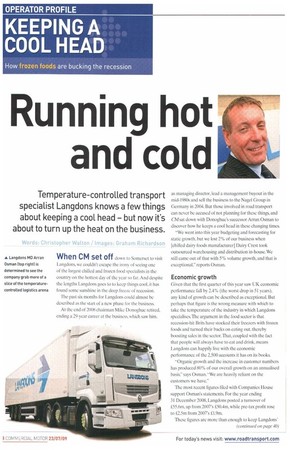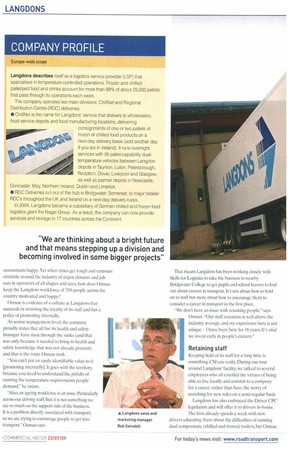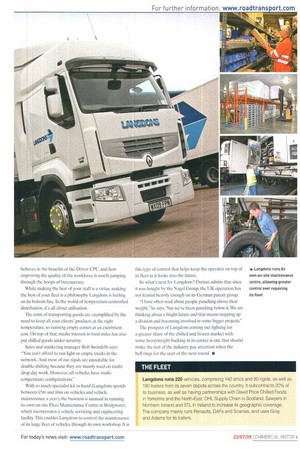Running hot and cold
Page 38

Page 40

Page 41

If you've noticed an error in this article please click here to report it so we can fix it.
Temperature-controlled transport specialist Langdons knows a few things about keeping a cool head but now it's about to turn up the heat on the business.
Words: Chrtstopher Walton Irnaries7 Graham Richardson
When CM set off down to Somerset to visit Langdons, we couldn't escape the irony of seeing one of the largest chilled and frozen food specialists in the country on the hottest day of the year so far. And despite the lengths Langdons goes to to keep things cool, it has found some sunshine in the deep freeze of recession.
The past six months for Langdons could almost be described as the start of a new phase for the business.
At the end of 2008 chairman Mike Donoghue retired, ending a 29-year career at the business, which saw him, as managing director, lead a management buyout in the mid-1980s and sell the business to the Nagel Group in Germany in 2004. But those involved in road transport can never be accused of not planning for these things, and CM sat down with Donoghue's successor Arran Osman to discover how he keeps a cool head in these changing times,
"We went into this year budgeting and forecasting for static growth, hut we lost 2% of our business when [chilled dairy foods manufacturer] Dairy Crest took outsourced warehousing and distribution in-house. We still came out of that with 5% volume growth, and that is exceptional,reports Osman.
Economic growth Given that the first quarter of this year saw UK economic performance fall by 2.4% (the worst drop in 51 years), any kind of growth can be described as exceptional. But perhaps that figure is the wrong measure with which to take the temperature of the industry in which Langdons specialises. The argument in the food sector is that recession-hit Brits have stocked their freezers with frozen foods and turned their backs on eating out, thereby boosting sales in the sector. That. coupled with the fact that people will always have to eat and drink, means Langdons can happily live with the economic performance of the 2,500 accounts it has on its books.
"Organic growth and the increase in customer numbers has produced 80% of our overall growth on an annualised basis," says Osman. "We are heavily reliant on the customers we have."
The most recent figures filed with Companies House support Osman's statements. For the year ending 31 December 2008, Langdons posted a turnover of £55.6m, up from 2007's £50.4m, while pre-tax profit rose to £2.5m from 2007's £1.9m.
These figures are more than enough to keep Langdons' accountants happy. Yet when times get tough and rumours circulate around the industry of depot closures and job cuts in operators of all shapes and sizes, how does Osman keep the Langdons workforce of MO people across the country motivated and happy?
Osman is evidence of a culture at Langdons that succeeds in retaining the loyalty of its staff and has a policy of promoting internally.
At senior management level, the company proudly states that all bar its health and safety manager have risen through the ranks (and that was only because it needed to bring in health and safety knowledge that was not already present); and that is the route Osman took.
"You can't put an easily identifiable value to it [promoting internally]. It goes with the territory. because you need to understand the pitfalls of running the temperature requirements people demand," he insists.
"Also, an ageing workforce is an issue. Particularly across our driving staff. But it is not something we see so much on the support side of the business It is a problem directly associated with transport, so we are trying to encourage people to get into transport," Osman says That means Langdons has been working closely with Skills for Logistis.s to take the business to nearby Bridgwater College to get pupils and school leavers to find out about careers in transport. It's not about how to hold on to staff but more about how to encourage them to consider a career in transport in the first place.
-We don't have an issue with retaining people," says Osman. "Our staff retention is well above the industry average, and my experience here is not unique — I have been here for 18 years. It's vital we invest early in people's careers."
Retaining staff
Keeping hold of its staff for a long time is something CM can verify. During our tour around Langdons' facility, we talked to several employees who all extolled the virtues of being able to live locally and commit to a company for a career, rather than have the worry of searching for new roles on a semi-regular basis.
Langdons has also embraced the Driver CPC legislation and will offer it to drivers in-house. The firm already spends a week with new drivers educating them about the difficulties of running dual-temperature (chilled and fro7en) trailers. hut Osman believes in the benefits of the Driver CPC, and how improving the quality of the workforce is worth jumping through the hoops of bureaucracy.
While making the best of your staff is a virtue, making the best of your fleet is a philosophy Langdons is feeling on its bottom line. In the world of temperature-controlled distribution, it's all about utilisation.
The costs of transporting goods are exemplified by the need to keep all your clients' products at the right temperature, so running empty comes at an exorbitant cost. On top of that, media interest in food miles has also put chilled goods under scrutiny Sales and marketing manager Rob Swindells says: "You can't afford to run light or empty trucks in the network. And most of our rigids are unsuitable for double-shifting because they are mainly used on. multidrop day work. However, all vehicles have multitemperature configurations."
With so much specialist kit to hand (Langdons spends between 15nn and 16m on vehicles and vehicle maintenance a year), the business is unusual in running its own on-site Fleet Maintenance Centre at Bridgwater, which incorporates a vehicle servicing and engineering facility. This enables Langdons to control the maintenance of its large fleet of vehicles through its own workshop. It is this type of control that helps keep the operator on top of its fleet as it looks into the future.
So what's next for Langdons? Osman admits that since it was bought by the Nagel Group, the UK operation has not leaned heavily enough on its German parent group.
"I have often read about people punching above their weight," he says. "hut we've been punching below it.We are thinking about a bright future and that means stepping up a division and becoming involved in some bigger projects."
The prospect of Langdons coming out fighting for a greater share of the chilled and frozen market with some heavyweight backing in its corner is one that should make the rest of the industry pay attention when the bell rings for the start of the next round.








































































































































